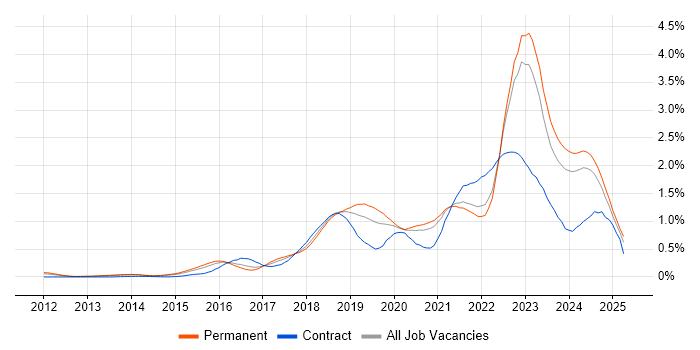Public Cloud
England > Yorkshire
The table below looks at the prevalence of the term Public Cloud in permanent job vacancies in Yorkshire. Included is a benchmarking guide to the salaries offered in vacancies that cited Public Cloud over the 6 months leading up to 30 May 2025, comparing them to the same period in the previous two years.
| 6 months to 30 May 2025 |
Same period 2024 | Same period 2023 | |
|---|---|---|---|
| Rank | 139 | 98 | 62 |
| Rank change year-on-year | -41 | -36 | +164 |
| Permanent jobs citing Public Cloud | 21 | 138 | 405 |
| As % of all permanent jobs advertised in Yorkshire | 0.71% | 2.28% | 5.27% |
| As % of the Miscellaneous category | 1.97% | 7.85% | 13.47% |
| Number of salaries quoted | 11 | 103 | 159 |
| 10th Percentile | £48,250 | £46,650 | £42,874 |
| 25th Percentile | £53,000 | £48,250 | £50,015 |
| Median annual salary (50th Percentile) | £68,000 | £62,783 | £67,071 |
| Median % change year-on-year | +8.31% | -6.39% | +3.19% |
| 75th Percentile | £83,875 | £69,500 | £92,500 |
| 90th Percentile | £100,000 | £81,786 | £109,865 |
| England median annual salary | £77,500 | £65,066 | £73,750 |
| % change year-on-year | +19.11% | -11.78% | -1.67% |
All Generic Skills
Yorkshire
Public Cloud falls under the General and Transferable Skills category. For comparison with the information above, the following table provides summary statistics for all permanent job vacancies requiring generic IT skills in Yorkshire.
| Permanent vacancies with a requirement for generic IT skills | 1,064 | 1,757 | 3,006 |
| As % of all permanent jobs advertised in Yorkshire | 35.76% | 28.98% | 39.13% |
| Number of salaries quoted | 483 | 1,257 | 1,400 |
| 10th Percentile | £25,313 | £27,000 | £33,998 |
| 25th Percentile | £33,000 | £35,000 | £40,188 |
| Median annual salary (50th Percentile) | £50,000 | £49,500 | £55,000 |
| Median % change year-on-year | +1.01% | -10.00% | - |
| 75th Percentile | £73,125 | £65,603 | £72,500 |
| 90th Percentile | £96,250 | £80,000 | £86,393 |
| England median annual salary | £60,000 | £55,000 | £65,000 |
| % change year-on-year | +9.09% | -15.38% | +4.00% |
Public Cloud
Job Vacancy Trend in Yorkshire
Job postings citing Public Cloud as a proportion of all IT jobs advertised in Yorkshire.

Public Cloud
Salary Trend in Yorkshire
3-month moving average salary quoted in jobs citing Public Cloud in Yorkshire.
Public Cloud
Salary Histogram in Yorkshire
Salary distribution for jobs citing Public Cloud in Yorkshire over the 6 months to 30 May 2025.
Public Cloud
Job Locations in Yorkshire
The table below looks at the demand and provides a guide to the median salaries quoted in IT jobs citing Public Cloud within the Yorkshire region over the 6 months to 30 May 2025. The 'Rank Change' column provides an indication of the change in demand within each location based on the same 6 month period last year.
| Location | Rank Change on Same Period Last Year |
Matching Permanent IT Job Ads |
Median Salary Past 6 Months |
Median Salary % Change on Same Period Last Year |
Live Jobs |
|---|---|---|---|---|---|
| West Yorkshire | -22 | 14 | £68,000 | +11.10% | 34 |
| North Yorkshire | +3 | 5 | - | - | 9 |
| South Yorkshire | +31 | 2 | £63,500 | +3.75% | 19 |
| Public Cloud England |
|||||
Public Cloud
Co-occurring Skills and Capabilities in Yorkshire by Category
The follow tables expand on the table above by listing co-occurrences grouped by category. The same employment type, locality and period is covered with up to 20 co-occurrences shown in each of the following categories:
|
|
|||||||||||||||||||||||||||||||||||||||||||||||||||||||||||||||||||||||||||||||||
|
|
|||||||||||||||||||||||||||||||||||||||||||||||||||||||||||||||||||||||||||||||||
|
|
|||||||||||||||||||||||||||||||||||||||||||||||||||||||||||||||||||||||||||||||||
|
|
|||||||||||||||||||||||||||||||||||||||||||||||||||||||||||||||||||||||||||||||||
|
|
|||||||||||||||||||||||||||||||||||||||||||||||||||||||||||||||||||||||||||||||||
|
|
|||||||||||||||||||||||||||||||||||||||||||||||||||||||||||||||||||||||||||||||||
|
|
|||||||||||||||||||||||||||||||||||||||||||||||||||||||||||||||||||||||||||||||||
|
|
|||||||||||||||||||||||||||||||||||||||||||||||||||||||||||||||||||||||||||||||||
